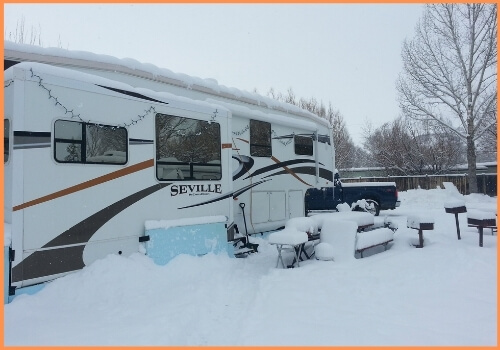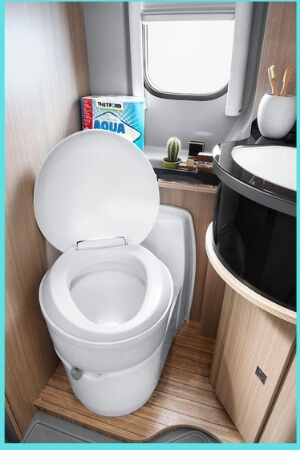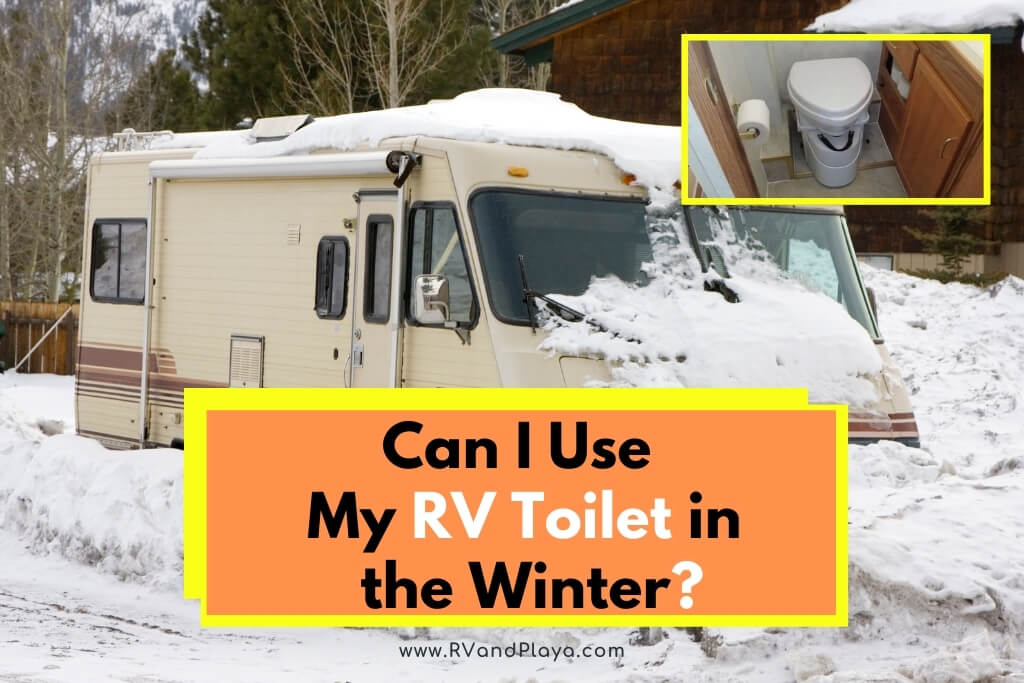If you are planning on wintering with your RV or camper, you may be wondering if you’ll still be able to flush the toilet when the temperature drops below freezing.
Winterizing a bathroom is a straightforward process and prevents the pipes that run your fresh, grey, and blackwater systems from bursting.
Can I use my RV toilet in the winter or in cold weather? Yes, you can use your RV’s toilet in the winter if you either already own a 4-season RV or have winterized your toilet with antifreeze.
There are also alternative toilet designs that can provide water-free or compact-waste disposal options that can be used during freezing temperatures.
If you already own a 4-season RV, then it should already be prepared for the winter months.
If not, you should be able to prepare your toilet system for the cold with a few steps. If you intend to travel and use your toilet in the winter months, you have to winterize your toilet.
Table of Contents
How Do You Prepare Your RV Toilet for Cold Weather?
If you take time before the weather starts to dip to prepare your black water system, then you should be able to use your RV’s toilet in the winter, albeit with some caution.
Is your RV already prepared for the winter months? 4-Season RVs are designed with this in mind and have features that regular campers do not.

These RVs heat and enclose the holding tanks and lines to make sure they don’t freeze.
Read also: Where to Properly Dump Portable Toilet Waste?
Check the owner’s manual of your RV to find this information out quickly.
If your RV is not already equipped for winter, don’t fret. Some simple solutions can get your toilet usable.
To prepare an RV toilet for cold weather use:
- Empty all the water from your black water and grey water holding tanks. Also, empty water from the toilet by flushing it until none is left.
- Check the toilet valve for water as well; this often gets overlooked.
- Refill your RV’s black water holding tank with RV antifreeze. You will need 3-6 gallons depending on tank size.
- Top-Off the tank by using only antifreeze in the toilet bowl. Pour some in the bowl every time your flush makes sure your toilet still operates as it should.
Related: Does RV Antifreeze Go Bad? Shelf Life of Antifreeze
Some extra tips
- Ensure to use non-toxic antifreeze to ensure everyone who uses the toilet, and any pets are safe.
- If your tanks are not heated and enclosed, your holding tanks’ dump valve can still freeze. This will prevent you from dumping your black water when it is full. If this happens, you will have to wait for it to thaw for use.
- Toilets aren’t the only system that might freeze up. Your greywater and freshwater systems also run the risk of freezing. Make sure you have addressed this by winterizing the entire system or heating the lines.
There are still limitations to bear in mind with winterizing an RV that is not already designed with cold-weather features.
Toilet function is just one of the many water usage areas that need to be addressed if you will be using your RV during freezing weather.
For the best function and convenience, consider looking into a 4-season RV.
What is a 4-Season RV?
A 4-season RV is designed to be used during year-round weather conditions.
This means they are specially equipped to fight the issues of wintering in your RV.
Read also: 5 Practical Ways To Unfreeze Water Lines In RVs (That Actually Work)
If you don’t want to worry about winterizing your toilet, buying a 4-season RV will provide the most convenience and comfort.
These RVs come equipped with:
1. Enclosed Holding Tanks
This feature makes sure your holding tanks are held inside your RV’s insulated shell.
The tanks may also have a heating system installed to keep them at a steady temperature in cold weather.
2. Heated/Enclosed Lines
Making sure your water lines are also safe from freezing temperatures will keep your toilet flushing and the shower running.
3. Extra Insulation
Proper insulation on all elements of your water system will ensure additional safety from freezing.
These RVs are intended for all year use and, as such, carry with them a heftier price tag than your average RV.
But 4-seasons are quality built and will last for a long time. Most offer additional comforts and features than just a winterized water system.
Read also: Is Charmin Toilet Paper safe for RV? – What You Need To Know
One thing to note about 4-Season RVs is that there isn’t much regulation for the term “4-Season”.
It is often the case that RVs advertised as 4-season, or all-season, fall short when it comes time to winter in these vehicles.
Buyers should be wary when dealing with salespeople who might throw around these promises without delivering.
When buying a new 4-season RV or camper, do a thorough evaluation of the vehicle. Be on the lookout for telltale signs that the RV is not prepared for the winter.
- Exposed holding tanks
- Water lines that run under the RV
- Dump valves located on the outside of the vehicle.
You need to make sure that all of the water systems are enclosed inside and heated.
If there are any signs that the water system is exposed to the cold, you will need to worry about winterizing.
Related: How Often Should I Drain My RV Water Heater? [The Trught]
If purchasing a new RV or winterizing your toilet isn’t appealing to you, there still are a few options for your cold-weather bathroom needs.
Are There RV Toilets That Don’t Use Water?
You can explore a few options if you are looking for an alternative to the above-listed solutions.
These options offer a permanent replacement to your RV’s toilet and come with their own upsides and downsides.
When thinking about replacing your toilet, consider factors like maintenance, use, and cleaning.
Here are the two leading contenders for a winter toilet replacement:
1. Composting Toilet
If you are looking for a green alternative to your waste disposal, consider a composting toilet.
These toilets divert your waste into a single or sometimes double-chambered composting area.
Composting uses the natural biological decomposition process to turn your waste into humus (the organic component of soil).
By design, they do not use water and can be safely used in the winter.
There is a lot to consider when purchasing a composting toilet; here is some more information if this seems like the option for you.
2. Cassette Toilet
These toilets can be another great option if you want to use your toilet in the winter.
The system is similar to a regular RV toilet; but, the black water tank is hidden at the toilet base. Its location inside the RV means it runs little risk of freezing.
The black water tanks are smaller and removable, meaning they will need to be emptied regularly.
This can be done at any RV waste dump or even into a regular toilet, one of this design’s main draws.
Both options offer a permanent solution to your winter toilet needs. They both, however, need more hands-on maintenance than a regular toilet system.

Composting and cassette toilets need to be cleaned and emptied by the user for proper use.
If you choose the composting option, you can dispose of the decomposed matter in your garden or just have the peace of mind that you are dumping non-toxic organic matter.
With the cassette, there are still some chemicals and water involved. The material is not safe and needs proper disposal.
If the thought of any of this makes you a bit squeamish, it might not be the right solution for you.
Read also: Is an RV Thermostat the Same as A House Thermostat? (What To Consider)
Conclusion
When wintering in your RV, it is possible to enjoy the comforts of a working toilet.
With a little preparation or the proper equipment, you can make sure that your toilet keeps flushing when the snow starts to fall.
Reference:
Nadaguides.com – RV Composting Toilets
Thetford.com – Preparing Your RV for Winter
Offgridexpo.com – What is a 4-Season RV
Recommended Reading
What Size Air Compressor Do You Need to Winterize an RV?
Can You Flush Tampons Down an RV Toilet? Facts You Should Know
Recent Posts
Is Toyota Remote Connect Free? (Subscription, Services Plans)
Does Toyota Remote Connect have an included trial? It used to be the case that, when you bought a new car, you made one straightforward payment and that was it. Now, it feels like there are...
Toyota Safety Connect: What It Is And Why You Need It? Whether you’re buying a new Toyota or you’ve had one for a while you will have been given the hard sell on their Connected Services but do...

